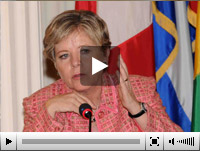- English
Lecture Series
Thirty Eighth Lecture - Alicia Barcena
Thirty Eighth Lecture - October 5, 2009
"In Search of Solutions to the Financial Crisis: Measures Taken and Future
Challenges”
Speaker:
Alicia Barcena, Executive Secretary, Economic Commission for Latin America and
the Caribbean (ECLAC)
In the XXXVIII Lecture of the Lecture Series of the Americas entitled: In Search of Solutions to the Financial Crisis: Measures Taken and Future Challenges, Alicia Barcena, Executive Secretary of the Economic Commission for Latin America and the Caribbean (ECLAC), shares her views on the current financial crisis and its impact on the future. She begins by explaining that this crisis is unlike any other for Latin America. This is the first time that Latin America has entered an economic crisis from prosperity, with solid politics, flexibility in exchange rates, high foreign reserves, and a surplus in the balance of payments.
Barcena contends that there is a “new normality” that will arise from the current economic crisis, characterized by a lower level of economic growth, a “jobless recovery,” a new political axis featuring the United States and China, and a rise in protectionism. In the case of Latin America, Barcena emphasizes that the countries are recovering at different rates but most have managed to implement effective counter-cyclical fiscal policies. In terms of growth, it is expected that by 2010 most countries will have returned to a rate of 3-4%. Barcena worries that “jobless recovery” will force workers into the informal sector, creating higher levels of poverty and indigence and especial challenges for women and children.
Barcena highlights two forms of protectionism that will affect the recovery of the global market: the first is the traditional form of buying domestically and refusing to purchase foreign goods; the second occurs in the financial and credit markets. Financial protectionism will reduce investment in developing countries until a multilateral regulatory system aimed at better global stability renews confidence in the investment market.
In order to confront the financial crisis, Barcena states that there needs to be legitimate global political bodies that reflect the needs of all the international community and that are inclusive, sustainable, and universally accountable. She states that, in the past, a few developed nations controlled the world order, while today, the G-20 and the United Nations Economic and Social Council (ECOSOC) offer new opportunities for global representation. The G-20 recently transferred 5% of the rights to vote from the over-represented developed countries to those that were underrepresented, and reiterated the importance of employment and equity in society. Within the United Nations, there is a proposal to elevate the ECOSOC to the same level as the General Assembly, and ensure fair regional representation in social and economic analysis and in the creation of objectives and political instruments.



